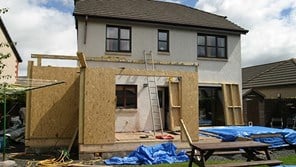Avoiding underinsurance at home
5 minute read

When taking out home insurance, you may have searched “how much cover do I need” or “how to calculate my home contents value” to make sure you were getting the right level of cover. But adding up the value of all the possessions you own or how much it could cost to rebuild your home isn’t always an easy job, and you’re unlikely to get it right down to the penny.

Get Home Insurance
Age Co helps homeowners over 50 find the right protection. We are 100% owned by Age UK and our profits go back to the charity.
While it can be time consuming or a little difficult to work out, it’s really important that your final figures are in the right ballpark, or you could be what’s known as underinsured.
What does underinsurance mean?
Underinsurance of the home is when the insurance policy you pay for isn’t enough to fully cover all of your belongings or your property.
It can be difficult to estimate your home’s total contents value and the building value (including any outbuildings, garden walls, etc.).
Underinsurance and rebuild cost
A rebuild cost is the amount you’d need to recreate your home from scratch if it was destroyed or damaged beyond repair.
It’s not the market value of your property or the price you paid for it, but the cost of replacing it like-for-like if it was lost in an insurable incident such as fire or severe weather.
Insurers use rebuild costs to work out your premiums and potential pay-outs and ensure they’re fair and fitting.
How does underinsurance happen?
The most common reason for being underinsured is simply miscalculation.
People may undercount their possessions, missing some off the list altogether or underestimating how many they have, such as books, clothes or even pots and pans.
Values: then vs now
Another mistake people can make is basing their insurance on what they believe an item is worth now, not if they were newly purchased. If an incident were to occur, the item would need to be replaced with a new one (provided the insurance policy is ‘New for Old’), not second-hand. This is the cost you should take into account.
For valuable or rare items, such as antiques, that may be difficult to replace, you should discuss the specifics with your insurance provider. They may not be covered under a standard policy and may need specialist protection. And if they are protected, it is still worthwhile confirming what amount you would receive in compensation, should they be stolen or damaged.

Tell your insurer about any home alternations
Another common mistake is not letting the insurance provider know of any substantial changes at home.
People forget that renovating, refurbishing and extending can increase the build value of their home, and don’t notify their provider of such changes, potentially making their current policy out of date.
This takes us to the next point, where people insure their property for its market price and not the rebuild cost. In some cases, the rebuild cost can be higher than the market value, and so you can accidentally underinsure yourself by using one but not the other.
High-value items
To avoid being underinsured, make sure you inform your insurer of certain high-value items, like a diamond ring.
Try not to underestimate your contents by excluding items over a certain cost. Generally, providers ask that costly items, usually over £1,500, be specified on the policy or insured separately.
What happens if I’m underinsured?
If you find you’re underinsured while going through a claim, your insurance provider may not cover you for all of the damage or replacement. The money you receive from your claim could be lower than the total contents value or cost of repair, and so you will need to spend some of your own money to make up the cost.
For example
If your home were to be flooded and your contents are insured for up to £55,000 but the cost to replace them is going to be £60,000, you may need to pay the difference to replace everything that was damaged.
What does 'sum insured' mean?
Sum insured refers to the maximum amount an insurer will pay out in the event of a claim.
The sum insured correlates directly to the amount you pay for your home insurance - but not always to the property's actual value or asset insured.
If the sum insured is less than the replacement value or required amount to rebuild, it is often referred to as underinsurance. This means that inflation is taken into account, as well as an increase in the cost of things such as bricks and other building materials.
It’s best to avoid underinsurance, so spend the time double checking your figures and confirming them with your insurance provider – it could save you trouble in the future.
Summary
When it comes to finding the right home insurance, keep these tips in mind to help avoid underinsurance:
- Try to do a full inventory of your home before you take out home insurance. This should help you understand the level of cover needed.
- During your calculations, make sure you factor in the cost of replacing an item with a new version.
- High-value items should be declared to an insurer, especially if they are worth over £1500, as they may need extra cover.
- Inform your insurer of any renovations or extensions to your home, so these modifications can be factored into your policy.
For more information on finding home insurance through Age Co, click here.

Sign up to the Age Co Newsletter
Each month, our email newsletter delivers inspiring stories, practical guides to later life, plus the latest news about Age Co and the charitable work we support.
